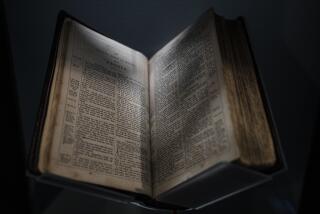No Public Funds for Religious Schools
Re “School Vouchers Win Backing of High Court,” June 28: Perhaps it is time to remind those whose pro-voucher rhetoric is the loudest that, by and large, it has been a free and public school system that has educated the great majority of individuals who have built this country into what it is, the greatest nation on Earth.
Although educational performance seems to be of prime consideration in the voucher movement, one need not be reminded that schools serve an even higher purpose, that of socializing young people of different cultures, economic backgrounds and ethnic and religious persuasions. And although that purpose is surely high on the agenda of any educator in any setting, public or private, I can think of no more conducive atmosphere in which it might be achieved than in a public school.
Educational choice is every parent’s right, and alternatives like charter and magnet schools are manifest in the public sector. Enhancing those types of learning environments is what public funds should be used for, not for subsidizing private or parochial education.
Howard Karlitz
Los Angeles
*
Chief Justice William Rehnquist writes that allowing public money to be spent for vouchers to religious schools “provides benefits directly to a wide spectrum of individuals, defined only by financial need and residence in a particular school district. It permits such individuals to exercise genuine choice among options public and private, secular and religious.”
However, religious institutions are exempt from the Americans With Disabilities Act. Children with disabilities will be left in a public school system that will have even less money, once vouchers are issued, to help educate them. By funneling public money into faith-based institutions, as with school vouchers and with the proposed faith-based service initiatives, people with disabilities (approximately 20% of the population) will be systematically denied choice and opportunity.
Elizabeth Bancroft MD
Co-Chair, Disability Community Accessibility Committee
Santa Monica
*
The stated purpose for vouchers is to give poor people the chance to send their children to better schools. The effective result will be to subsidize middle- and upper-class parents who already can afford better education.
There needs to be a requirement that any school receiving vouchers must admit all qualified students and accept the voucher as “payment in full” if the family can’t afford to pay more.
Bill Serantoni
Thousand Oaks
*
The Supremes have outdone themselves this session. Vouchers for private schools, drug testing of school choirs (“Student Drug Test Law Valid,” June 28). Here’s an idea: How about random drug testing of Supreme Court justices?
Mike Wright
Irvine
*
You can’t say “one nation under God” in the Pledge of Allegiance, but you can use taxpayer money to support religious schools through vouchers. Now, that’s what I call separation of church and state.
John Zavesky
Los Angeles
*
An important, less-noble driver for school vouchers: The state could adopt vouchers of $2,000 per child, at the level of only 25% to 33% of the real cost of elementary and secondary education per child. Then all of us who proclaim faith in school choice can use the savings of 75% to 67% per child to have our property and state taxes reduced. This is a scheme worthy of Enron’s legacy.
D. A. Papanastassiou
San Marino






